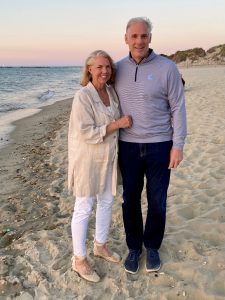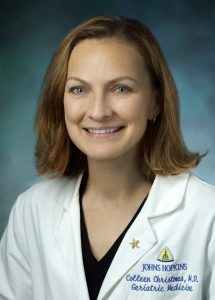Johns Hopkins UniversityEst. 1876
America’s First Research University
Kris Jenner remembers his Johns Hopkins University School of Medicine classmate Rosemarie Hope Reid as someone who made an impression on everyone she encountered; her positive energy could alleviate the stress among the twenty-somethings enduring the rigors of medical school with her.

“She was just a remarkable person who was destined to improve humanity and was tragically taken prematurely,” says Jenner, who graduated with Reid in 1992. “You can’t undo the past. However, I’m grateful to do something in her memory that can have an important impact on the future.”
That something is the Rosemarie Hope Reid, M.D., Professorship that Jenner and his wife and fellow School of Medicine graduate Susan Cummings, Med ’90 (MD), SPH ’91 (MPH), established earlier this year — both to recognize Reid and advance primary care education at Hopkins. “This professorship is an embodiment of Rosemarie’s commitment to primary care and to patient care,” Jenner says.
Reid was a first-year pediatric resident at the Wright-Patterson Air Force Hospital in Dayton, Ohio, when she lost her life in a car accident on May 7, 1993, at the age of 27. She was a class leader whose kindness, generosity, and enthusiasm were an inspiration to her classmates, many of whom contributed to a scholarship in her name following her death. The scholarship continues to support medical students at Hopkins.
Yet Jenner wanted to do more to elevate Reid’s memory. Conversations with the Vice Dean of Education Roy Ziegelstein, MD, and the School of Medicine’s development team led to the primary care professorship, “an amazing marriage of Hopkins’ goals and Rosemarie’s legacy,” Jenner says.
While Hopkins has a rich history of educating leaders in medicine, there hasn’t been a strong emphasis on primary care. Being presented with the opportunity to fund the professorship demonstrated that the school was making the field a priority.
“For Hopkins to be saying, ‘This is important’ — it’s actually a maturation, in my opinion, of the school saying that you need frontline workers who are going to provide outstanding care and to lead in the field of primary care,” Cummings says.
What’s more, Hopkins already had an outstanding candidate — Colleen Christmas, MD, director of the Primary Care Leadership Track (PCLT) at Hopkins — to receive the professorship.

Christmas came to Johns Hopkins in 1996 for fellowship training in geriatric medicine and has been a faculty member since 1999. She became the inaugural PCLT director in 2014 and has received many teaching accolades, including the Excellence in Teaching Award from the Johns Hopkins University Alumni Association in 2013.
“I am quite honestly overwhelmed to be the inaugural recipient of the Rosemarie Hope Reid, M.D., Professorship. This is validation for the work I and many others do in primary care education and offers exciting opportunities to innovate in that area,” Christmas says. “I genuinely believe this funding will enable Johns Hopkins to lead in primary care education on par with its leadership in research and specialty care training.”
Christmas says she’s been trying to learn as much as she can about Reid. “Her medical school class created a scholarship in her honor, and now Drs. Kris Jenner and Susan Cummings created this professorship. Clearly, she made a tremendous impact on everyone she encountered, so much so that decades after her premature death Drs. Cummings and Jenner so generously created this professorship to keep her legacy alive at Hopkins,” she says. “I think that says quite a lot about the kind of person Rosemarie was, and the kind of people Drs. Cummings and Jenner are. Having her name attached to mine is a constant motivator to strive to be worthy of that name. It feels both happy and heavy at the same time.”
Due to the pandemic, Jenner and Cummings have only been able to meet virtually with Christmas, but they were taken immediately by her openness and warm personality.
“Rosemarie was a friend to many people. And I think Colleen Christmas is that way. The kind of person who is personable. When she speaks to individuals, they feel really important and that they’re seen,” Cummings says.
The PCLT focuses on providing comprehensive care of patients over the course of their lifetimes. Since its launch, 22 students have graduated and 41 are currently enrolled. The three-year program provides specialized training and mentorship in internal medicine, geriatrics, pediatrics, and family medicine. Students work with a single faculty member over the course of three years to help them experience both acute and chronic disease management and develop the relationships that draw people to primary care fields. Students participate in monthly workshops covering topics in primary care and leadership skills and complete primary care-focused research projects.
A dedicated leader in primary care education, supported in perpetuity through the Reid professorship, is certain to attract more students to the field.
“It’s just such a gift,” Reid’s sister Ellen Kiernan says. “Smart students going into primary care who really care — that’s what ‘Ro’ was all about. She was really brilliant. She thought she’d help more people if she went towards primary care. That’s what really drove her.”
Interested in supporting faculty in the Johns Hopkins University School of Medicine?
Topics: Alumni, Faculty and Staff, School of Medicine, Fuel Discovery, Promote and Protect Health